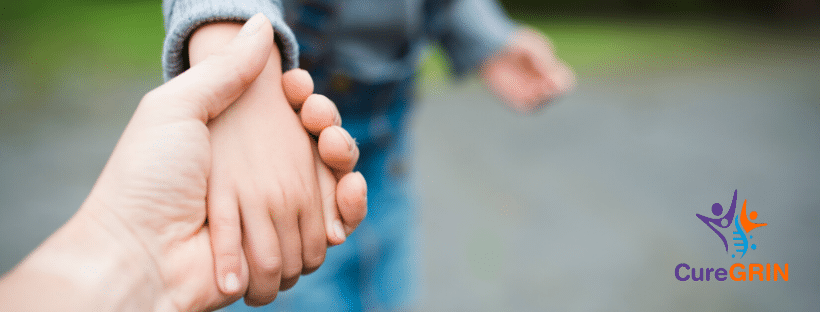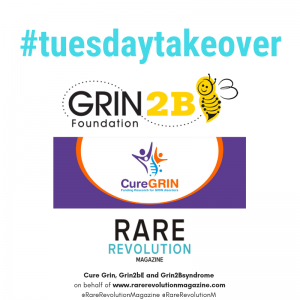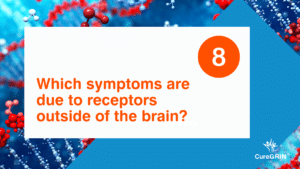Three Things You Should Know About Our Kids with GRIN Disorder
Share This Post

Many individuals with GRIN Disorder are non-verbal or have limited communication abilities. Some use devices and switches to communicate and often, us parents, have become so in-tune with our kids that we can read their non-verbal cues such as facial expressions, vocalization, looking to or reaching for objects, looking away when not interested, or signs of excitement such as kicking their feet or shaking their arms. Sometimes understanding our kids comes easily to us parents. But often, even we don’t even understand what they are trying to express. The worse is when they are in pain or sick. Many times, we play a guessing game to find the source of their discomfort.
My son, Brett, is six years old and is non-verbal. He has been in Augmentative & Alternative Communication (AAC) therapy at Jill Tullman’s and Associates for two years and is learning how to use a device to communicate. We have a long way to go before he can effectively use #AAC. In the meantime, I am caught between two goals: 1) To help Brett to learn to communicate and 2) To teach the world around him to understand him better.
In the last series of four questions, we asked family members on the CureGRIN Facebook page to tell us what they believe their loved ones with #GRINDisorder would want others to know about them. Parents responses make it clear there are several common ideas that we feel our children would express if they could:
They Understand More than Some Might Think
I believe my son, Brett, would want others to know that he listens, and he understands so much more than even I give him credit for. “Do not underestimate the things I can do or understand”, says Lauren W. (GRIN1 Mom), about what she thinks her son, Carter, would announce to the universe. Beth B. (GRIN2A Mom) says her daughter, Carly, would want people to know that she is just a normal kid that has faced a lot in her short life. That she understands more than people think and she has a lot to say if you give her the chance.

Ellen Bohm, internationally renowned author who specializes in communication with those on the spectrum says, “Presuming that a nonverbal child has nothing to say is like presuming an adult without a car has nowhere to go.” She is so right. I often find myself making choices and speaking for Brett. Then, in his own way, he reminds me that he is a whole person with thoughts, feelings, and preferences. If you listen with more than ears, you can hear what they are saying.
They are Happy Because They Are Loved Deeply
Syd is happy and strong. He led his entire medical staff through “I believe I can fly” as they were sedating him for an MRI. He is cognitively above average even if his speech is such that you have a hard time understanding him. He is an incredible problem-solver. Don’t judge him by his surface, but to look at the brilliant, funny, loving soul inside. Rebecca W. (GRIN2B Mom). Natasha L. (GRIN1 Mom) believes her son, Aiden, would say, “Don’t feel sorry for me or my mom/dad. I am the happiest most smiley baby ever and mom/dad are so grateful to be chosen as my parents in this life!” Vita is pure joy. Her condition doesn’t change how we feel about her. She is like any other of our children. We may be more worried about her future and health, but to us she is no different than her siblings. She is Vita. Life. In every meaning. Federica M. (GRIN2A Mom). Ivy G. (GRIN2B Mom) says her daughter would express, “I have a perfectly normal life full of smiles, laughs, hugs, playing, worries, cries, and happiness. I am smart, happy, and unique. Mum and dad are so proud of me, my achievements, my efforts, my strong personality and attitude”.
Come Closer – They Want to be Included
Kelly L’s (GRIN2A Mom) daughter, Kaelin, is a fighter. She does not allow things to stop her. She sees the joy in life and while she may not do things the same way as you, that does not mean she cannot do things in her own way. “I love to be around you. Please don’t ignore me or shy away from me. Come closer and talk to me. I may not be able to talk but laughing comes easily to me and I’d like to share some smiles with you. I’ll understand more than you think, and I really want to be included in everything especially if it involves music or walks outside.” Rebecca F. (GRIN1 Mom), says about her son’s, Oliver, deepest desires. Zoe C. (GRIN2B Mom) believes her daughter would say, “I just want someone to talk to me, play with me and take time to get to know me. I am fun, cheeky and happy and will make you laugh in pure unadulterated joy.”
I believe Brett would want others to know that he is happy and loved as well. He wants and likes the same things as other kids his age. Like so many of our kids with GRIN Disorder, he loves to be part of the fun and included. I see this when he goes to school. There are many mornings when I’m getting him in his adaptive stroller and he’s so happy to know he’s about to go to school, that he starts kicking his little legs, banging on his stroller tray, and smiling and vocalizing his excitement. His enthusiasm brings joy to the other parents and teachers as I’m pushing my happy guy to kindergarten.
Fear of the unknown often keeps people from interacting with our kids. In some ways they are no different. Our kids feel the same feelings you do, says Klara C. (GRIN1 Mom). If you are someone with little or no exposure to the world of special needs, if you give them a chance, they can teach you things you didn’t’ know, not only about them, but also about yourself. Don’t shy away. Lean in, listen, ask questions, and include them. It’s important for parents to demonstrate this to typically developed kids who are watching and learning from the adults around them. If you are a student, you have a tremendous opportunity to model an inclusive behavior to your peers. It’s up to all of us to help advance our thinking and understanding of those with disabilities.
Our kids have so much to offer and speak a heart-felt universal language of love and joy. Who couldn’t use more of these qualities in our lives?
Read more Posts

Rare Revolution Magazine Tuesday Takeover
Share This Post Share on facebook Share on linkedin Share on twitter Share on email Previous Next On Tuesday, July 2, 2019, Rare Revolution Magazine

